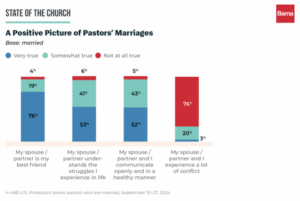
NEW DELHI (BP)–The Hindu nationalist Bharatiya Janata Party in India’s Gujarat state has implemented an “anti-conversion” law passed in 2003, increasing fears among Christians that it will open the door to false accusations by Hindu extremists.
India’s Freedom of Religion Acts, referred to as anti-conversion laws, now have been implemented in five of India’s 28 states. The laws seek to curb religious conversions made by “force,” “fraud” or “allurement.” But Christians and human rights groups say that in reality the laws obstruct conversion generally, as Hindu nationalists invoke them to harass Christian workers with spurious arrests and incarcerations.
Individuals convicted of “forced” conversion could receive up to three years in jail according to rules of implementation framed on April 1 for the Gujarat Freedom of Religion Act of 2003, The Times of India reported.
The newspaper’s April 26 report noted: “From now on, anyone wishing to convert will have to tell the government why they were doing it and for how long they had been following the religion which they were renouncing, failing which, they will be declared offenders and prosecuted under criminal laws.”
Dominic Emmanuel, spokesman for the Delhi Catholic Archdiocese, told Compass Direct News, “There is absolutely no truth in the allegation that Christians use unfair means to convert the poor and Dalits [so-called untouchables] to Christianity.”
Besides numerous false complaints by Hindu nationalist groups against Christian workers under other states’ anti-conversion laws, the legislation has a negative social impact on Christians, Emmanuel said, “as people try to ostracize the Christian community whose only purpose to them seems to be to convert, thereby belittling all the social work the community does for the masses.” Christian workers are prevented “from reaching out to the needy, who too will continue to suffer,” Emmanuel said.
Such legislation also lessens the issue of whether those who break away from the caste hierarchy of Hinduism should be treated on equal status with other believers, Emmanuel said.
The legislation seems to leave many citizens with a false impression that conversion itself is illegal in the country, he added, noting that intolerant Hindus frequently accuse Christians merely of “conversion” rather than “forced” or “fraudulent” conversion.
The key purpose of anti-conversion rhetoric, which later gets translated into anti-conversion laws, is to “demonize the miniscule, peace-loving Christian community with an eye on consolidating the Hindu votes,” Emmanuel said. According to the 2001 census, there are only 284,092 Christians in Gujarat, which has a total population of more than 50 million.
The BJP in Gujarat, in western India, is infamous for persecuting religious minorities of Muslims and Christians. In 2002, Hindu nationalist groups killed more than 2,000 Muslims as the BJP government reportedly looked on. In 1998, Hindutva (Hindu nationalist) extremists launched a series of attacks for more than 10 days in Gujarat’s Dangs district.
The rules under the Gujarat law make it obligatory for clergy to obtain prior permission of the district magistrate in order to avoid police action when assisting in an individual’s conversion from one religion to another.
Clergy will be required to sign a detailed form providing such information on the person who is converting as whether he/she is a minor, a member of a Scheduled Caste (Dalit) or Tribe (aboriginal), her/his marital status, occupation and monthly income.
“Anyone willing to convert will have to apply to the district magistrate a month before the rituals involved in conversion and give details on the place of conversion, time and reason,” The Times of India reported. “After getting converted, the person will have to obligatorily provide information within 10 days on the rites to the district magistrate, reason for conversion, the name of the priest who has carried out the ritual and full details of the persons who took part in the ceremony.”
The district magistrate will have to send a quarterly report to the government listing the number of applications for prior permission, comparative statistics of the earlier quarter, reasons for granting or not granting permission, number of conversions and number of actions against offenders.
Although Christians are now more apprehensive about their safety in Gujarat, the BJP’s move was not unexpected.
The Gujarat government had taken up the legislation a month after revoking an amendment bill, the Gujarat Freedom of Religion (Amendment) Bill of 2006, which sought to make the law more stringent, but which had been opposed by Gujarat Gov. Nawal Kishore Sharma. The BJP revoked the amendment bill on March 10 in an apparent attempt to implement the 2003 version of the legislation that had remained dormant.
The repealed amendment bill stipulated that people from the Jain and Buddhist faiths would be construed as denominations of Hindu religion -– a provision that was opposed by leaders from the Jain and Buddhist communities, as even the government census distinguishes between Hinduism and the other two faiths. The bill also had sought to exclude from the definition of “conversion” the renouncing of one denomination for another.
In addition to the anti-conversion laws now in force in five states -– Gujarat, Orissa, Madhya Pradesh, Chhattisgarh and Himachal Pradesh — they have been passed but are not yet implemented in Arunachal Pradesh and Rajasthan states. The BJP also has introduced amendment bills to make existing anti-conversion laws more stringent in the states of Madhya Pradesh and Chhattisgarh. But both bills are facing objections by their respective governors.
The head of the National Commission for Minorities, Mohammad Shafi Qureshi, has said the panel will set up a committee to examine whether anti-conversion laws in India throttle people’s freedom to practice any faith, the Indo-Asian News Service reported on March 28.
–30–
Vishal Arora is a writer in New Delhi. Compass Direct News, based in Santa Ana, Calif., provides reports on Christians worldwide who are persecuted for their faith. Used by permission.













